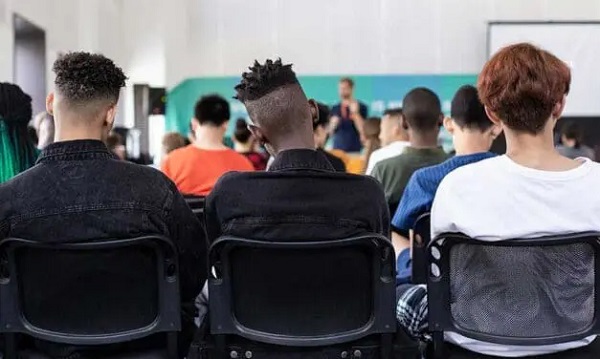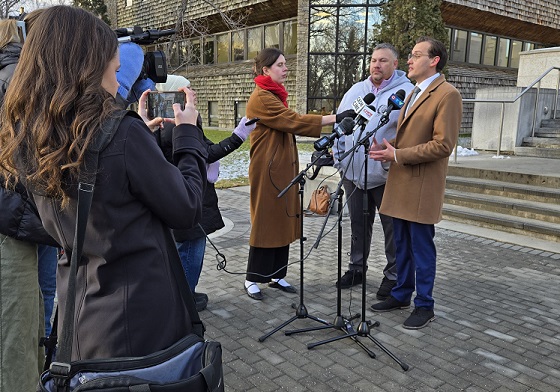Education
Our Kids Are Struggling To Read. Phonics Is The Easy Fix

From the Frontier Centre for Public Policy
One Manitoba school division is proving phonics works
If students don’t learn how to read in school, not much else that happens there is going to matter.
This might be a harsh way of putting it, but it’s the truth. Being unable to read makes it nearly impossible to function in society. Reading is foundational to everything, even mathematics.
That’s why Canadians across the country should be paying attention to what’s happening in Manitoba’s Evergreen School Division. Located in the Interlake region, including communities like Gimli, Arborg and Winnipeg Beach, Evergreen has completely overhauled its approach to reading instruction—and the early results are promising.
Instead of continuing with costly and ineffective methods like Reading Recovery and balanced literacy, Evergreen has adopted a structured literacy approach, putting phonics back at the centre of reading instruction.
Direct and explicit phonics instruction teaches students how to sound out the letters in words. Rather than guessing words from pictures or context, children are taught to decode the language itself. It’s simple, evidence-based, and long overdue.
In just one year, Evergreen schools saw measurable gains. A research firm evaluating the program found that five per cent more kindergarten to Grade 6 students were reading at grade level than the previous year. For a single year of change, that’s a significant improvement.
This should not be surprising. The science behind phonics instruction has been clear for decades. In the 1960s, Dr. Jeanne Chall, director of the Harvard Reading Laboratory, conducted extensive research into reading methods and concluded that systematic phonics instruction produces the strongest results.
Today, this evidence-based method is often referred to as the “science of reading” because the evidence overwhelmingly supports its effectiveness. While debates continue in many areas of education, this one is largely settled. Students need to be explicitly taught how to read using phonics—and the earlier, the better.
Yet Evergreen stands nearly alone. Manitoba’s Department of Education does not mandate phonics in its public schools. In fact, it largely avoids taking a stance on the issue at all. This silence is a disservice to students—and it’s a missed opportunity for genuine reform.
At the recent Manitoba School Boards Association convention, Evergreen trustees succeeded in passing an emergency motion calling on the association to lobby education faculties to ensure that new teachers are trained in systematic phonics instruction. It’s a critical first step—and one that should be replicated in every province.
It’s a travesty that the most effective reading method isn’t even taught in many teacher education programs. If new teachers aren’t trained in phonics, they’ll struggle to teach their students how to read—and the cycle of failure will continue.
Imagine what could happen if every province implemented structured literacy from the start of Grade 1. Students would become strong readers earlier, be better equipped for all other subjects, and experience greater success throughout school. Early literacy is a foundation for lifelong learning.
Evergreen School Division deserves credit for following the evidence and prioritizing real results over educational trends. But it shouldn’t be alone in this.
If provinces across Canada want to raise literacy rates and give every child a fair shot at academic success, they need to follow Evergreen’s lead—and they need to do it now.
All students deserve to learn how to read.
Michael Zwaagstra is a public high school teacher and a senior fellow at the Frontier Centre for Public Policy.
Education
Johns Hopkins University Announces Free Tuition For Most Students


From the Daily Caller News Foundation
Johns Hopkins University (JHU) announced on Thursday it is making tuition free for families earning less than $200,000 and will waive both tuition and living expenses for those making less than $100,000.
The university stated that “a majority of American families” will qualify for the fee exemption, allowing most students to attend without contributing a single dollar. The decision is meant to help recruit “the best and brightest students to Johns Hopkins irrespective of their financial wherewithal.”
“Trying to understand financial aid offers can be overwhelming,” David Phillips, vice provost for admissions and financial aid at JHU, said in the announcement. “A big goal here is to simplify the process. We especially want to reach students and families from disadvantaged backgrounds, rural locations, and small towns across America who may not know that a Hopkins degree is within reach.”
Dear Readers:
As a nonprofit, we are dependent on the generosity of our readers.
Please consider making a small donation of any amount here.
Thank you!
In 2018, Michael Bloomberg donated nearly $2 billion to the university, the largest ever single gift to a U.S. university. JHU said it used this money “to become permanently need blind and no-loan in financial aid.”
The university also receives the most federal funding of any university, raking in more than $3 billion from the government in fiscal year 2023 for research and development alone. This is more than double what the next highest recipient of federal funding that year, the University of Washington, received.
Despite this, JHU in June complained that federal funding cuts forced it to institute a hiring freeze and pause annual pay increases for employees. In its message to the community at the time, the university also mentioned its disagreement with “recent efforts to limit or withhold visas from the international students and scholars.”
Some universities admit mass numbers of foreign students in order to pad their pockets, as such students often pay full tuition and fee costs without financial assistance.
Education
Why classroom size isn’t the issue teacher unions think it is

This article supplied by Troy Media.
The real challenge is managing classrooms with wide-ranging student needs, from special education to language barriers
Teachers’ unions have long pushed for smaller class sizes, but the real challenge in schools isn’t how many students are in the room—it’s how complex those classrooms have become. A class with a high proportion of special needs students, a wide range of academic levels or several students learning English as a second language can be far more difficult to teach than a larger class
where students are functioning at a similar level.
Earlier this year, for example, the Elementary Teachers’ Federation of Ontario announced that smaller class sizes would be its top bargaining priority in this fall’s negotiations.
It’s not hard to see why unions want smaller classes. Teaching fewer students is generally easier than teaching more students, which reduces the workload of teachers. In addition, smaller classes require hiring more teachers, and this amounts to a significant financial gain for teachers’ unions. Each teacher pays union dues as part of membership.
However, there are good reasons to question the emphasis on class size. To begin with, reducing class size is prohibitively expensive. Teacher salaries make up the largest percentage of education spending, and hiring more teachers will significantly increase the amount of money spent on salaries.
Now, this money could be well spent if it led to a dramatic increase in student learning. But it likely wouldn’t. That’s because while research shows that smaller class sizes have a moderately beneficial impact on the academic performance of early years students, there is little evidence of a similar benefit for older students. Plus, to get a significant academic benefit, class sizes need to be reduced to 17 students or fewer, and this is simply not financially feasible.
In addition, not only does reducing class sizes mean spending more money on teacher compensation (including salaries, pensions and benefits), but it also leads to a decline in average teacher experience and qualifications, particularly during teacher shortages.
As a case in point, when the state of California implemented a K-3 class-size reduction program in 1996, inexperienced or uncertified teachers were hired to fill many of the new teaching positions. In the end, California spent a large amount of money for little measurable improvement in academic performance. Ontario, or any other province, would risk repeating California’s costly experience.
Besides, anyone with a reasonable amount of teaching experience knows that classroom complexity is a much more important issue than class size. Smaller classes with a high percentage of special needs students are considerably more difficult to teach than larger classes where students all function at a similar academic level.
The good news is that some teachers’ unions have shifted their focus from class size to classroom complexity. For example, during the recent labour dispute between the Saskatchewan Teachers’ Federation (STF) and the Saskatchewan government, the STF demanded that a classroom complexity article be included in the provincial collective agreement. After the dispute went to binding arbitration, the arbitrator agreed with the STF’s request.
Consequently, Saskatchewan’s new collective agreement states, among other things, that schools with 150 or more students will receive an additional full-time teacher who can be used to provide extra support to students with complex needs. This means that an extra 500 teachers will be hired across Saskatchewan.
While this is obviously a significant expenditure, it is considerably more affordable than arbitrarily reducing class sizes across the province. By making classroom complexity its primary focus, the STF has taken an important first step because the issue of classroom complexity isn’t going away.
Obviously, Saskatchewan’s new collective agreement is far from a panacea, because there is no guarantee that principals will make the most efficient use of these additional teachers.
Nevertheless, there are potential benefits that could come from this new collective agreement. By getting classroom complexity into the collective agreement, the STF has ensured that this issue will be on the table for the next round of bargaining. This could lead to policy changes that go beyond hiring a few additional teachers.
Specifically, it might be time to re-examine the wholesale adoption of placing most students, including those with special needs, in regular classrooms, since this policy is largely driving the increase in diverse student needs. While every child has the right to an education, there’s no need for this education to look the same for everyone. Although most students benefit from being part of regular academic classes, some students would learn better in a different setting that takes their individual needs into consideration.
Teachers across Canada should be grateful that the STF has taken a step in the right direction by moving beyond the simplistic demand for smaller class sizes by focusing instead on the more important issue of diverse student needs.
Michael Zwaagstra is a senior fellow with the Frontier Centre for Public Policy.
Troy Media empowers Canadian community news outlets by providing independent, insightful analysis and commentary. Our mission is to support local media in helping Canadians stay informed and engaged by delivering reliable content that strengthens community connections and deepens understanding across the country
-

 Alberta2 days ago
Alberta2 days agoPremier Smith explains how private clinics will be introduced in Alberta
-

 Alberta2 days ago
Alberta2 days agoAlberta introducing dual practice health care model to increase options and shorten wait times while promising protection for publicly funded services
-

 Business2 days ago
Business2 days agoUS Supreme Court may end ‘emergency’ tariffs, but that won’t stop the President
-

 Aristotle Foundation1 day ago
Aristotle Foundation1 day agoWe’re all “settlers”
-

 Indigenous1 day ago
Indigenous1 day agoIndigenous activist wins landmark court ruling for financial transparency
-

 Alberta1 day ago
Alberta1 day agoRed Deer’s Jason Stephan calls for citizen-led referendum on late-term abortion ban in Alberta
-

 International2 days ago
International2 days ago“The Largest Funder of Al-Shabaab Is the Minnesota Taxpayer”
-

 espionage1 day ago
espionage1 day agoSoros family has been working with State Department for 50 years, WikiLeaks shows


